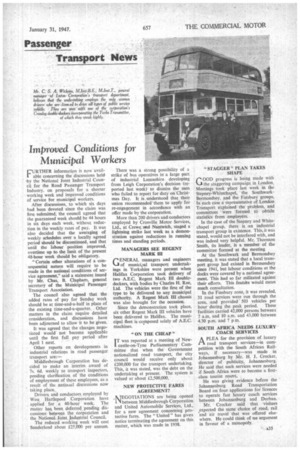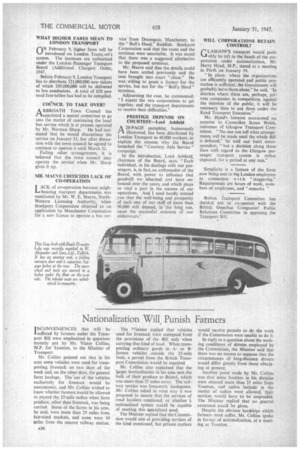Improved Condition.s for
Page 45

Page 46

If you've noticed an error in this article please click here to report it so we can fix it.
Municipal Workers
FURTHER information is now available concerning the discussions held by the National Joint Industrial Council for the Road Passenger Transport Industry, on proposals for a shorter working week and improved conditions of service for municipal workers.
After discussions, to which six days had been devoted since the claim was first submitted, the council agreed that the guaranteed week should be 44 hours in six days each week, without reduction in the weekly rates of pay. It was also decided that the averaging of weekly schedules over a locally agreed period should be discontinued, and that until the labour 'position improved, overtime up to the limit of the present 48-hour week should be obligatory.
"Certain other alterations of a consequential nature will require to be made in the national conditions of service agreement," said a statement issued by Mr. Chas. B. Clapham, general secretary of the Municipal Passenger Transport Association.
The council also agreed that the added rates of pay for Sunday work should be at time-and-a-half in place of the existing time-and-a-quarter. Other matters in the claim require detailed consideration, and discussions have been adjourned to allow it to be given.
It was agreed that the changes negotiated would not become applicable until the first full pay period after April 1 next.
Other reports on developments in industrial relations in road passenger transport are:— Middlesbrough Corporation has decided to make an interim award of 7s. 6d. weekly to transport inspectors, pending clarification of the conditions of employment of these employees, as a result of the natioaal discussions now taking place..
Drivers and conductors employed by West Hartlepool Corporation have applied for a 40-hour week. The matter has been deferred. pending discussions, between the Corporation and the National. Joint. Industrial Council.
The reduced working week will cost Sunderland about £25,000 per annum. There was a strong possibility of a strike of bus operatives in a large part of industrial Lancashire developing from Leigh Corporation's decision (reported last week) to dismiss the men who failed to report for duty on Christmas Day. It is understood that their union recommended them to apply for re-engagement in accordance with an offer made by the corporation.
More than 200 drivers and conductors employed by Crosville Motor Services, Ltd., at Crewe Enid Nantwich, staged a lightning strike last week as a demonstration against reductions in running times and standing periods.
MANAGERS SEE REGENT MARK HI
GENERAL managers and engineers of municipal transport undertakings in Yorkshire were present when Halifax Corporation took delivery of two A.E.C. Regent Mark III doubledeckers, with bodies by Charles H. Roe, Ltd. The vehicles were the first of the type to be delivered to any municipal authority. A Regent Mark III chassis was also brought for the occasion.
Since the demonstration took place, six other Regent Mark III vehicles have been delivered to Halifax. The municipal fleet is composed solely of A.E.C. machines.
"ON THE CHEAP" IT was reported at a meeting of New' castle-on-Tyne Parliamentary Committee that when the Government nationalized road transport, the city council would receive only about £200,000 for the transport undertaking. This, it was stated, was the debt on the undertaking at present. The system is valued at about £2,500,000.
NEW PROTECTIVE FARES AGREEMENT? ,MEGOTIATIONS are being opened 11 between Middlesbrough Corporation and United Automobile Services, Ltd., for a new agreement concerning protective fares. The " United " has given notice terminating the agreement on this matter, which was made in 1938.
" STAGGER " PLAN TAKES SHAPE
GOOD progress is being made with the staggering campaign in London. Meetings took place last week in the Stepney-Whitechapel, • the SouthwarkBermondsey. and the Finsbury groups. In each case a representative of London Transport explained the problem, and committees were formed to obtain statistics from employers.
In the case of the Stepney and Whitechapel group, there is an industrial transport group in existence. This, it was stated, would not be interfered with, and was indeed very helpful. Mr. Thornton Smith, its leader, is a member of the committee formed at the meeting At the Southwark and Bermondsey meeting, it was stated that a local transport group had existed in Bermondsey since 1941, but labour conditions at the docks were covered by a national agreemalt. This had so far militated against their efforts. This featulre would mean much consultation.
In the Finsbury zone, it was revealed. 31 road services were run through the area, and provided' 503 vehicles per hour during the peak period. These facilities carried 42,000 persons between 7 a.m. and 10 a.m. and 43,000 between 4.30 p.m. and 7 p m.
SOUTH AFRICA NEEDS LUXURY COACH SERVICES
APLEA for the provision of luxury road transport services—in competition with the South African Railways, if necessary—was made in Johannesburg by Mr. H. J. Crocker, director of publicity, Johannesburg. He said that such services were needed if. South Africa were to become a firstclass tourist resort.
He was giving evidence before the Johannesburg Road Transportation Board on four applications for licences to operate fast luxury coach services between Johannesburg and Durban.
Mr. Crocker said that visitors expected the same choice of road, rail and air travel that was offered elsewhere. He could think of no argument in favour of a monopoly.
WHAT HIGHER FARES MEAN TO . LONDON TRANSPORT ON February 9, higher fares will be introduced on London Transport's system. The increases are authorized under the London Passenger Transport Board (Additional Charges) Order, 1947.
Before February 9, London Transport has to distribute 321,000,000 new tickets of which 205,000,000 will be delivered to bus conductors. A total of 650 new road fare-tables has had to be compiled.
CONCH., TO TAKE OVER?
ARBROATH Town Council has appointed a special committee to go into the matter of continuing the local bus service which is at present operated by Mr. Norman Sharp. He had intimated that he would discontinue the service on January 31, but after discussion with the town council he agreed to continue to operate it until March 31.
Failing other arrangements, it is believed that the town council may operate the service when Mr. Sharp gives it up.
MR. MACVE CRITICIZES LACK OF CO-OPERATION I ACK of co-operation between neigh
bouring tramport departments was mentioned by Mr. W. E. Macve, NorthWestern Licensing Authority, when Stockport Corporation objected to an application by Manchester Corporation for a new licence to operate a bus ser
vice from Deansgate, Manchester, to the "Bull's Head," Reddish. Stockport Corporation said that the route and the terminus were unsuitable. It was stated that there was a suggested alternative to the proposed terminus.
Mr. Macve said that the details could have been settled previously and the case brought into .court "clean." He was willing to grant a licence for the service, but not for the "Bull's Head" terminus.
Adjourning the case, he commented: "I expect the two corporations to get together, and the transport departments to resolve their difficulties."
PRESTIGE DEPENDS ON COURTESY—Lord Ashfield
A20-PAGE pamphlet, humorously illustrated, has been distributed by London Transport to 40,000 workers, to explain the reasons why the Board launched the "Courtesy Aids Service" campaign.
In the introduction, Lord Ashfield, chairman of the Board, says: "Each individual, in his dealings with our passengers, is, in fact, an ambassador of the Board, with power to influence that goodwill we inherited and have enhanced over the years, and which plays so vital a part in the success of our operations. And I need hardly remind you that the well-being and prosperity of each one of our staff of more than 90,000 will depend, in 'the long run, upon the successful outcome of our endeavours." WILL CORPORATIONS RETAIN CONTROL?
GLASGOW'S transport 'would probably be left in the hands of the corporation under nationalization, Mr. Harry Hynd, 141.P., stated at a meeting in Perth on January 19.
"In place, whete the organizations are efficiently operated and public protection is sufficient, the Government will probably leave them.alone," he said. "In districts where there are, perhaps, private companies in competition, against the interests of the public, it will be necessary then to put them under the Road Transport Executive."
Mr. Hynd's forecast occasioned no surprise to Councillor James Welsh, convenor of Glasgow Transport Committee. "No one can tell what arrangements will be made until the whole Bill is debated," he told our localcorrespondent, "hut a decision along those lines with regard to the Glasgow passenger transport system is rather expected, for a period at any rate."
Simplicity is a feature of the form now being sent to big London employers in connection w it h "staggering." Requirements are hours of work, numbers of employees, and "remarks. "
Bolton Transport Committee has decithcl not to co-operate with the British Omnibus Companies' Public Relations Committee in opposing the Transport Bill.
•












































































